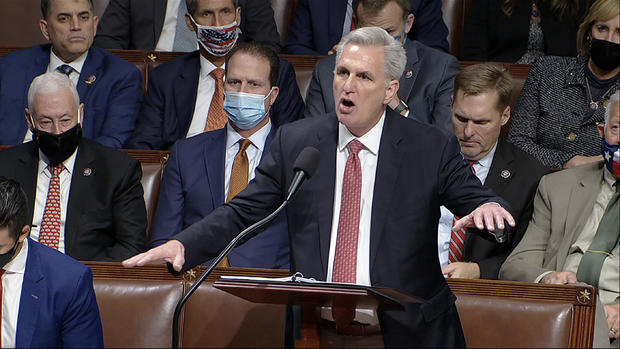The House delayed the vote on President Biden’s signature Build Back Better social spending plan until Friday as Minority Leader Kevin McCarthy spoke at great length.
His high-energy speech was still going Friday morning more than seven hours after it started. By then, only a handful of representatives were still in the chamber.
The speech capped off a busy evening on Capitol Hill after the nonpartisan Congressional Budget Office (CBO) released its cost estimate for the bill. Several moderate Democrats had said they wanted to wait for that score before they voted.
At least two of the moderates who were holding out for the CBO score said Thursday night that they would vote for the bill and another moderate, Congressman Henry Cuellar, of Texas, also indicated he would.
But Democrats’ handle on the measure remained razor-thin. Representative Jared Golden, of Maine, was still expressing reservations and, with the Democrats’ slim majority, they can only afford to lose three votes. No Republicans are likely to support the legislation.
The CBO said it would increase the deficit by more than $367 billion over 10 years. But the estimate does not include the revenue that could be generated from increasing IRS enforcement, which the CBO suggested would be $207 billion.
Treasury Secretary Janet Yellen welcomed the CBO’s analysis. Noting that the Treasury Department estimates that the crackdown on tax evaders would raise $400 billion, she said in a statement that the combined CBO score, Joint Committee on Taxation estimates and her own department’s analysis “make it clear that Build Back Better is fully paid for, and in fact will reduce our nation’s debt over time by generating more than $2 trillion through reforms that ask the wealthiest Americans and large corporations to pay their fair share.”
The CBO has been releasing estimates on individual components of the Build Back Better Act over the past few weeks, but did not address how much money the legislation would raise, or its cost, until Thursday.
Overall, the CBO estimates the legislation would result in spending $1.63 trillion. The office said changes to the tax code and other provisions would generate more than $1.26 trillion in revenue and suggested increased IRS enforcement would add $207 billion in revenue.
Some of the CBO figures have come in lower than Biden administration estimates. The cost of universal pre-K and affordable child care would be roughly $382 billion, the agency found, compared to the bill’s line item figure of $400 billion. Prescription drug reforms would save nearly $300 billion — $50 billion more than the White House estimated. Other estimates were closer: Both put affordable housing-related costs at roughly $150 billion. And the CBO said expanding Medicare to include hearing would cost $36 billion, while the White House said it would be $35 billion.
The CBO also estimated that a four-week paid leave included in the House version of the bill would cost $205 billion. That provision was not included in the revised White House framework because paid leave had been dropped from the bill but was later partially restored by lawmakers.
The White House, which estimated its framework would cost $1.75 trillion, claims it would reduce the deficit over time, generating more than $2.1 trillion over 10 years.
After the House vote on Build Back Better, the bill will head over to the Senate, where the Democrats’ 50-seat majority will surely lead to more changes.
Jack Turman and Brian Dakss contributed to this report.


